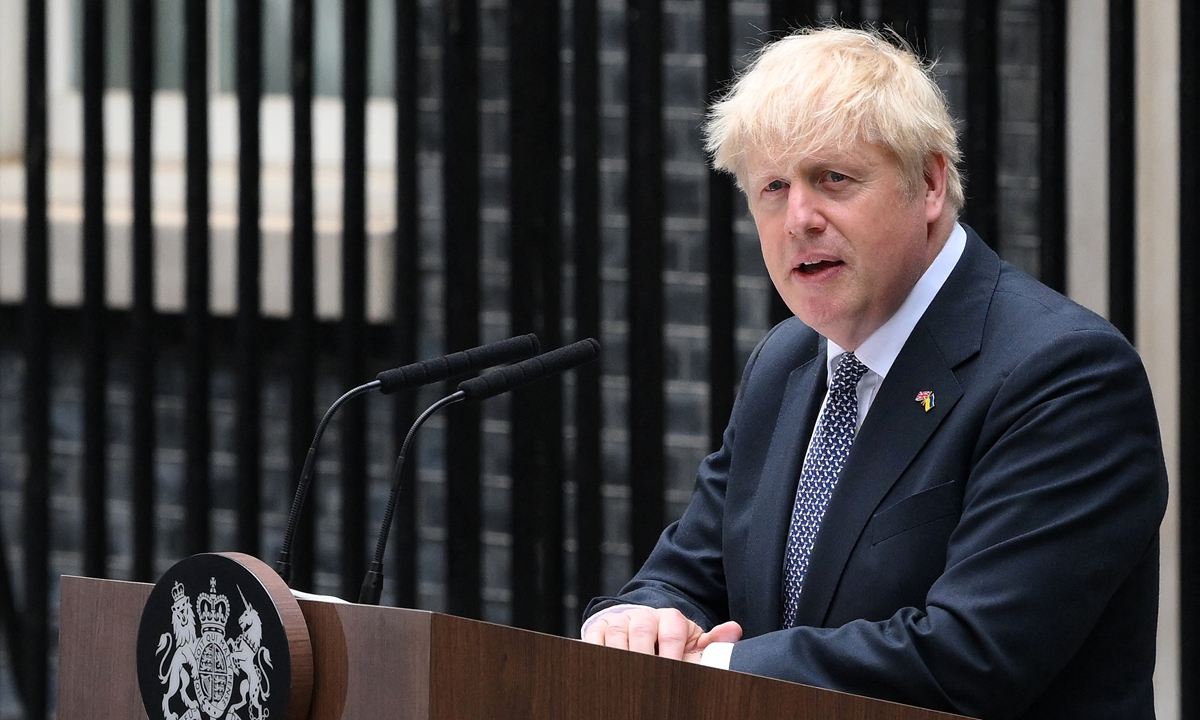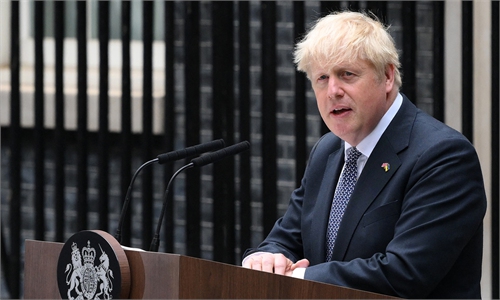UK loses global influence with declining national strength, shaky internal politics

Britain's Prime Minister Boris Johnson makes a statement in front of 10 Downing Street in central London on Thursday.Photo:AFP
After UK Prime Minister Boris Johnson announced his resignation, the country could enter a stage without a long-term prime minister, as the country has failed to find a way to keep its national strength from declining after Brexit and there is no politician who can effectively fix the country's internal divergences, while trying to use the Ukraine crisis as an opportunity to maintain UK influence has proved unhelpful for London to solve its internal problems, analysts said on Monday, as a number of politicians jostle to replace Johnson in a packed race.
According to Reuters, the contest to replace Johnson gathered pace on Sunday as five more candidates declared their intention to run, with many pledging lower taxes and a clean start from "Johnson's scandal-ridden premiership."
Conservative MPs are beginning to put their names forward in the race to succeed Boris Johnson as Conservative leader and prime minister, BBC reported. A timetable for the Tory leadership race is due to be confirmed next week and the new prime minister is expected to be in position by September.
Wang Yiwei, director of the Institute of International Affairs at Renmin University of China, told the Global Times on Monday that the UK is no longer as appealing or influential as it used to be, "with the queen getting older and older, and with questions over the extent that the royal family has a role in presenting the glory of the UK, and due to its declining national strength after Brexit, the governments led by Theresa May (2016-19) and Johnson both acted like transitional governments to handle the impacts of Brexit."
Cui Hongjian, director of the Department of European Studies at the China Institute of International Studies, told the Global Times on Monday that the frequent changes of government have shown that Brexit will continue to impact the country in the long term and is still impacting the country, as the Conservative Party is also without a consensus on the Brexit issue.
"How to normalize the governance of the UK and let the country recover from Brexit is still the prominent challenge that the entire UK political circle needs to solve," Cui noted.
Chinese analysts also said that after the Russia-Ukraine crisis, it seems that the UK is trying to seek more influence by actively getting involved in the crisis in the continent of Europe, and also trying to become involved in security issues in Asia to make up for the international influence that it has lost after Brexit.
In the latest UK move, British forces have begun training Ukrainian soldiers in a new program to help in their fight against Russia. Up to 10,000 Ukrainian soldiers will arrive in the UK for specialist military training lasting several weeks. The first cohort met UK defense secretary Ben Wallace on Thursday, the UK Ministry of Defense confirmed, the Guardian reported.
Some military experts said it's questionable to what extent a few weeks of training could help Ukraine overcome the military advantage held by Russia. Furthermore, considering the experience of the US when training foreigners to fight regimes that the US wanted to overthrew in other countries, these Ukrainian soldiers might prefer to stay in the UK as immigrants rather than return to Ukraine.
Many UK policies involving overseas issues just lead to more problems, such as increasing pressure in receiving refugees and immigrants, rather than finding more opportunities to boost its economy, said analysts. They noted that this just makes the UK the weakest major power among the five permanent members of the UN Security Council, and its diplomacy of closely following the US also means it has fewer alternatives in dealing with other major powers.
This deep-rooted problem is actually caused by the West's political system, as it has already resulted in phenomena like Brexit and the rise of Trumpism. This means it is unable to balance the system run by the elites and the governance of the grass roots through increasing populism, Cui said. He pointed out that the problem now is many in the West still believe that the biggest "threat" to their democracy is the political systems of other non-Western powers, especially China, as they believe China's system is making the Western system appear less attractive.
Future of the UK
British media is now focusing on who will become Johnson's successor to clean up the mess and bring the country back on track. Rishi Sunak, former chancellor of the exchequer (finance minister), is now the favorite, according to betting odds. He leads the field, followed by Minister of State for Trade Policy Penny Mordaunt and Foreign Secretary Liz Truss, BBC reported.
According to the Financial Times on July 1, 2021, when Sunak was the finance minister, he used his annual Mansion House speech to insist that Britain beef up its trading relationship with China, while admitting that efforts to reopen direct access to EU financial services markets had failed.
Sunak was downbeat on the prospects for a new regulatory deal with the EU, but insisted that the City of London was well placed to serve a fast growing Chinese "financial services market with total assets worth 40 trillion pounds ($47.8 trillion)." He believes the UK can strike a balance in dealing with China between having political differences and boosting cooperation on trade and economy.
However, there are also hard-liners like Foreign Secretary Truss who intends to intensify relations with China and make greater efforts to serve the US strategy to contain China. Truss said on June 30 that "the West must learn from its mistakes in failing to deter Russia's invasion of Ukraine and apply those lessons to protect peace and stability in the Taiwan Strait," Reuters reported.
To compare the Ukraine crisis with the Taiwan question, a matter of China's sovereignty and core interest and one that has nothing to do with other countries, is a typical narrative used by some Western politicians who want to replicate the mess they had made in Europe in Asia, so that they can spark more chaos and make more regions suffer from bloc vs. bloc confrontation, and they have no idea how dangerous it would be to support and encourage secessionists in Taiwan island to interrupt China's national reunification process, experts said.
The UK undoubtedly believes that it's a "core member of the West following the US" in terms of politics, diplomacy and military matters, but the UK also believes it is necessary to maintain cooperation with other major economies, especially China, on issues such as economy and trade or global climate change, Cui said.
However, "as the US is making great efforts to push competition with China, this may make it more difficult for the UK to find a balance between the two major powers," Cui said, because the US is demanding its allies, including the UK, to stand closer with it, not just in terms of political security, but also in terms of technology and other issues.
The future of the UK is also in question. It could be more certain and stabler with more opportunities, but could also be risky and full of uncertainties and tensions, said Wang.
"To what extent the UK will be able to find its own place in the future international arena depends on how the new [UK] government is able to strike a balance between the maritime and continental powers, and the balance between traditional industries and the new digital and ecological economies," Wang remarked.


